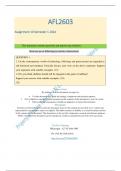AFL2603
Assignment 10 Semester 1 2024
This document contains questions and step by step solutions.
Hook me up on WhatsApp for further elaborations.
QUESTION 1
1.1 In the contemporary world of technology, folksongs and praise poems are regarded as
old-fashioned and outdated. Critically discuss your view on the above statement. Support
your argument with suitable examples. (15)
1.2 Do you think children should still be engaged in the game of riddling?
Support your answer with suitable examples. (10)
/25/
Terms of use:
By making use of this document you agree to:
Use this document as a guide for learning, comparison and reference purpose,
Not to duplicate, reproduce and/or misrepresent the contents of this document as your own work,
Fully accept the consequences should you plagiarise or misuse this document.
Disclaimer:
Extreme care has been used to create this document, however the contents are provided “as is” without any
representations or warranties, express or implied. The author assumes no liability as a result of reliance and use
of the contents of this document. This document is to be used for comparison, research and reference purposes
ONLY. No part of this document may be reproduced, resold or transmitted in any form or by any means.
TeeVee Tutoring
WhatsApp: +27 81 844 1995
Or click the link below:
http://wa.me/27818441995
, Question 1
1.1.
In the contemporary world of technology, folksongs and praise poems are often
considered old-fashioned and outdated. However, this perspective overlooks the
enduring cultural significance and relevance of these traditional art forms. Folksongs
and praise poems serve as valuable repositories of cultural heritage, preserving the
history, values, and identity of communities around the world.
Firstly, folksongs and praise poems are integral components of oral traditions, offering
insights into the collective experiences and perspectives of a society. For example, in
many indigenous cultures, folksongs are used to recount tales of heroism, love, and
resilience, transmitting cultural knowledge from one generation to the next. These
songs provide a window into the cultural values and beliefs of a community, fostering
a sense of connection and belonging among its members.
Furthermore, folksongs and praise poems play a vital role in cultural expression and
resistance. In regions experiencing social or political upheaval, such as during apartheid
in South Africa or the Civil Rights Movement in the United States, folksongs served as
powerful tools of protest and solidarity. Artists like Miriam Makeba and Bob Dylan
used their music to advocate for social justice and inspire change, demonstrating the
enduring relevance of these art forms in addressing contemporary issues.
Moreover, folksongs and praise poems offer unique aesthetic experiences that cannot
be replicated by modern technology. The rhythmic cadence of traditional drumming,
the harmonious melodies of folk tunes, and the evocative imagery of oral poetry engage
the senses and stimulate the imagination in ways that digital media cannot replicate.
These art forms provide opportunities for communal participation and creative
expression, fostering social cohesion and emotional resonance within communities.




